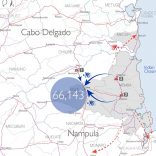Mozambique: New case of mpox diagnosed in Maputo province
WOAH donates 100,000 rabies vaccines to Mozambique

All photos: Ministério da Agricultura, Ambiente e Pescas
The World Organisation for Animal Health (WOAH) donated 100,000 doses of rabies vaccine to Mozambique on Tuesday, out of the 350,000 the country needs for vaccination campaigns, which it previously had only in emergency reserves.
“We had some limitations, because we only had some reserves, for emergency issues,” the deputy national director of the National Health and Biosafety Directorate, Abel Xilundo, told reporters after receiving these doses in Maputo, emphasising that they will allow the vaccination process to be “expanded”.
He said that in 2024 there were 31 deaths caused by rabies in Mozambique, while this year, until June, there had already been 14, out of a total of around 19,000 animal bites.
The emergency doses that the country had were meanwhile used to reinforce vaccination after cases in Tete province, he added.
According to the Ministry of Agriculture, Environment and Fisheries, this delivery, valued at $80,000, is part of the “Zero by 30” initiative, which aims to eliminate human deaths caused by canine rabies by 2030.

“This batch allows us to distribute the vaccine to all provinces, including those at higher risk, and to ensure the implementation of a rabies vaccination campaign, particularly for dogs and cats,” he explained, adding that Mozambique plans to procure 350,000 doses this year. Following this donation — requested by the country through the WHO as a member — the remaining 250,000 doses are expected to arrive by the end of the year.
The deputy national director emphasised that the donation “will contribute on a large scale to saving the government’s efforts in acquiring” vaccines, “but above all to expanding” the vaccination process and thereby ensuring that the country has protected animals, without them representing “a danger to public health”.
“Rabies is a disease that kills, and unfortunately, still kills in our country. And this donation from the World Organisation for Animal Health really reinforces the government’s efforts to control this deadly disease,” concluded Abel Xilundo.













Leave a Reply
Be the First to Comment!
You must be logged in to post a comment.
You must be logged in to post a comment.